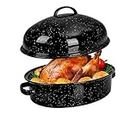You are using an out of date browser. It may not display this or other websites correctly.
You should upgrade or use an alternative browser.
You should upgrade or use an alternative browser.
Holiday safety tip ....
- Thread starter Shiftless2
- Start date
NCIDQ
People spend about 90% of their time indoors.
Interior design is not regulated everywhere in the U.S. and Canada.
People spend about 90% of their time indoors.
Interior design is not regulated everywhere in the U.S. and Canada.
Shiftless2
Well-known member
And at this time of year it's not just Christmas decor you've got to think about. Thanksgiving is this Thursday and it's a given that someone out there is going to want to try frying a turkey. When it's properly done the results are great but it's not the safest thing to do if you have no idea what you're doing.
So a hint or two is in order: Thaw it. Dry it completely. Allow for the added volume in the pot (see capitalized paragraph after the vid). Turn off the burner before putting the bird in the hot oil. Lower it slowly.
THAW YOUR TURKEY FIRST (THIS MAY TAKE A FULL DAY OR MORE). BEFORE FILLING WITH OIL, PLACE TURKEY IN EMPTY POT, FILL WITH WATER UNTIL TURKEY IS COVERED, REMOVE TURKEY, MARK WATER LEVEL. EMPTY WATER AND FILL OIL TO MARK. NOW DRY YOUR TURKEY AND PROCEED.
A couple of things you should have figured out after watching the vid: Don't do this inside or in the garage. Don't do it on your porch. Make sure your kids aren't nearby (face it, you'll never forgive yourself if you splash them with boiling oil.
So a hint or two is in order: Thaw it. Dry it completely. Allow for the added volume in the pot (see capitalized paragraph after the vid). Turn off the burner before putting the bird in the hot oil. Lower it slowly.
THAW YOUR TURKEY FIRST (THIS MAY TAKE A FULL DAY OR MORE). BEFORE FILLING WITH OIL, PLACE TURKEY IN EMPTY POT, FILL WITH WATER UNTIL TURKEY IS COVERED, REMOVE TURKEY, MARK WATER LEVEL. EMPTY WATER AND FILL OIL TO MARK. NOW DRY YOUR TURKEY AND PROCEED.
A couple of things you should have figured out after watching the vid: Don't do this inside or in the garage. Don't do it on your porch. Make sure your kids aren't nearby (face it, you'll never forgive yourself if you splash them with boiling oil.
note:
The author of post #4 is anything but a culinary consultant.
Thus the following is offered not necessarily as recipe for traditional holiday banquet bliss.
It's an alternative to tradition.
imgur #3 offers us insight into the joys of frying a turkey. There are other options.

A turkey baster for example, is intended to help flavor a roast turkey by bathing the turkey in the juices rendered during the cooking process. BUT !!
To use a turkey baster, the oven door is opened, and the lid on the roasting pan lifted.
The result is the cooking temperature can plummet by hundreds of degrees, for recycling these cooking juices for less than 1% of total cooking time.

The cooking oil illustrated in post #3 is flammable, and tends to induce detrimental health affects in food cooked in it.
The roasting pan approach pictured above may make an appealing banquet table presentation.
But for those open to subordinating appearance for health benefits, consider:
The apparatus depicted in post #3 can be used to boil the turkey in water, rather than fry it in oil. BUT !
Such elaborate apparatus is not required. A traditional cauldron, stock pot can be used on a simple stove top burner. No oven needed.
For those interested in excluding excess fat from the diet, skin the turkey before placing it in the cauldron. If giblets are bagged inside the body cavity, insure the bag is removed before cooking.
As room in the cauldron allows, fill the body cavity and available space in the cauldron with potatoes, carrots, parsnips, garlic cloves, & season to taste.
If the turkey is skinned before simmering, use the skin to wipe a sheen of fat on the bottom of the cauldron to help limit contents sticking to the cauldron bottom.
The familiar cooking guideline of 22 minutes per pound can be applied with this technique.
But this process renders the turkey literally falling off the bone delicious.
The banquet table presentation may be non-traditional. But the benefits of cleaner living are difficult to exaggerate.
Leave room, as the water level will rise during the cooking process.
The water the turkey is simmered in becomes gelatin at refrigerator temperature, and is delicious stock for making rice, or other cooking needs.
And as we give thanks this Thursday, please include the many laborers whose continuing good works have shielded US from the agony of famine for over half a century.
And a reminder these many helping hands are those of faithful workers both legal and illegal alike.
The author of post #4 is anything but a culinary consultant.
Thus the following is offered not necessarily as recipe for traditional holiday banquet bliss.
It's an alternative to tradition.
Counterpoint:"Turn off the burner before putting the bird in the hot oil." #3
imgur #3 offers us insight into the joys of frying a turkey. There are other options.

A turkey baster for example, is intended to help flavor a roast turkey by bathing the turkey in the juices rendered during the cooking process. BUT !!
To use a turkey baster, the oven door is opened, and the lid on the roasting pan lifted.
The result is the cooking temperature can plummet by hundreds of degrees, for recycling these cooking juices for less than 1% of total cooking time.

The cooking oil illustrated in post #3 is flammable, and tends to induce detrimental health affects in food cooked in it.
The roasting pan approach pictured above may make an appealing banquet table presentation.
But for those open to subordinating appearance for health benefits, consider:
The apparatus depicted in post #3 can be used to boil the turkey in water, rather than fry it in oil. BUT !
Such elaborate apparatus is not required. A traditional cauldron, stock pot can be used on a simple stove top burner. No oven needed.
For those interested in excluding excess fat from the diet, skin the turkey before placing it in the cauldron. If giblets are bagged inside the body cavity, insure the bag is removed before cooking.
As room in the cauldron allows, fill the body cavity and available space in the cauldron with potatoes, carrots, parsnips, garlic cloves, & season to taste.
If the turkey is skinned before simmering, use the skin to wipe a sheen of fat on the bottom of the cauldron to help limit contents sticking to the cauldron bottom.
The familiar cooking guideline of 22 minutes per pound can be applied with this technique.
But this process renders the turkey literally falling off the bone delicious.
The banquet table presentation may be non-traditional. But the benefits of cleaner living are difficult to exaggerate.
Skin the turkey, grease the inside bottom of the cauldron, place the turkey into the cauldron cavity opening facing up, add as many potatoes etc as fit, then add cold water to within a few inches of the top."Turn off the burner before putting the bird in the hot oil." #3
Leave room, as the water level will rise during the cooking process.
The water the turkey is simmered in becomes gelatin at refrigerator temperature, and is delicious stock for making rice, or other cooking needs.
And as we give thanks this Thursday, please include the many laborers whose continuing good works have shielded US from the agony of famine for over half a century.
And a reminder these many helping hands are those of faithful workers both legal and illegal alike.
Shiftless2
Well-known member
In other words - consider roasting that turkey instead of frying it. Completely different result but still tasty.
Shiftless2
Well-known member
Former neighbor - he used to live in a very rural area where he served on the volunteer fire department. Said they always had a lot of housefire calls at Thanksgiving and Christmas/New Years because of people deciding to fry their own turkeys.
- totally -"note:
The author of post #4 is anything but a culinary consultant." s #4
I'm not sure my contribution here (so far) rises to the level of "recommendation", or even "suggestion".
It's an "observation" that basting a turkey submerges the bird in its own juices for less than 1% of its cooking time, and plummets the heat repeatedly, prolonging cooking time.
But by simmering, it remains submerged 100% of that time.
And since "moist" is an adjective of praise for such cooking, an obvious choice.
"Roast"?"In other words - consider roasting that turkey instead of frying it. Completely different result but still tasty." S2 #5
Not sure. Some may consider it "boil". I'd call it "simmer".
I run the stove top burner on maximum heat until the cauldron reaches rolling boil.
Then I dial the flame back so the water in the cauldron is at a simmer. BUT !
Instead of cooking in its own juices <1% as with the roast & baste technique, it's literally submerged in them during 100% of the cooking process, & the cooking temperature doesn't plummet to near room temperature during cooking as it does by basting.
roast (rōst)
v.tr.
1. To cook with dry heat, as in an oven or near hot coals.
sim·mer (sĭmər)
v.intr.
1. To be cooked gently or remain just at or below the boiling point.
baste (bāst)
tr.v.
To moisten (meat, for example) periodically with a liquid, such as melted butter or a sauce, especially while cooking.
Synonyms: boil, simmer, seethe, stew
These verbs mean, both literally and figuratively, to stir up or agitate. To boil is to heat a liquid until it churns with bubbles. Figuratively it pertains to intense agitation, often from anger: She boiled with rage at the insult.
Simmer denotes gentle cooking just at or below the boiling point. Figuratively it refers to a state of slow, contained ferment: Plans were simmering in his mind. The employees simmered with resentment over the cut in benefits.
To seethe is to boil steadily and vigorously. Its figurative usage can suggest vigorous activity or passionate emotion: "The arc lamp's cone of light seethes with winged insects" (Claire Davis). "The city had ... been seething with discontent" (John R. Green).
Stew refers literally to slow boiling and figuratively to a persistent but not violent state of agitation: "They don't want a man to fret and stew about his work" (William H. Whyte, Jr.)
The American Heritage® Dictionary of the English Language, Fifth Edition copyright ©2022 by HarperCollins Publishers. All rights reserved.
CAVEAT:
I'm not aware of this simmer cooking technique being suggested elsewhere.
The nearest I've seen to a suggestion (short of recommendation) for such cooking was in the survival / education The History Channel television series ALONE.
There food safety, in the form of thorough cooking, may have been more important than culinary presentation. BUT !!
It's delicious.
But be prepared to transfer this main course of turkey, & vegetables to a serving tray, as when thoroughly cooked, it naturally automatically separates from the bones.
"Former neighbor - he used to live in a very rural area where he served on the volunteer fire department. Said they always had a lot of housefire calls at Thanksgiving and Christmas/New Years because of people deciding to fry their own turkeys." S2 #6
It's a useful reminder. Don't let children play with matches.
PUBLIC SAFETY NOTICE ! !
Frying a turkey is a horrendously bad idea. Any doubters should study post #3 of this thread in detail, - OR - verify your home insurance policy covers full replacement cost.
PS
#3 demonstrates, frying requires delaying submerging the turkey in oil until the cooking oil has reached cooking temperature.
Boiling / simmering does NOT.
The turkey goes into the cauldron first, then after vegies, giblets, seasoning, & all other ingredients, add water up to within a few inches of the cauldron rim.
It's easier to add a little water than it is to remove it.
AND !
Boiling oil / its vapors are flammable. Water is a fire-fighting agent.
Frying a turkey at home is a horrendous idea. Why risk it when safer alternatives yield more healthful meals?
#3 demonstrates, frying requires delaying submerging the turkey in oil until the cooking oil has reached cooking temperature.
Boiling / simmering does NOT.
The turkey goes into the cauldron first, then after vegies, giblets, seasoning, & all other ingredients, add water up to within a few inches of the cauldron rim.
It's easier to add a little water than it is to remove it.
AND !
Boiling oil / its vapors are flammable. Water is a fire-fighting agent.
Frying a turkey at home is a horrendous idea. Why risk it when safer alternatives yield more healthful meals?
Shiftless2
Well-known member
PUBLIC SAFETY NOTICE ! !
Frying a turkey is a horrendously bad idea. Any doubters should study post #3 of this thread in detail, - OR - verify your home insurance policy covers full replacement cost.


